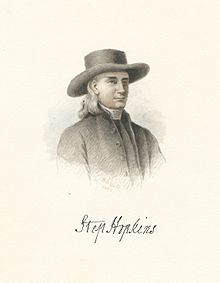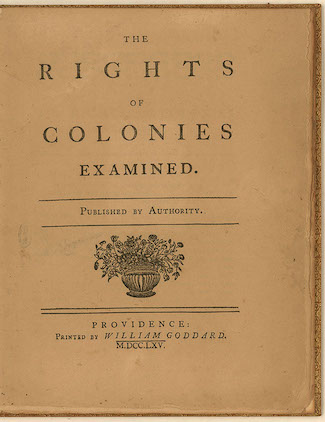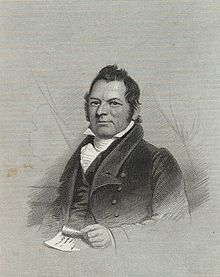Declaring the Independence of his slave
 Stephen Hopkins (1707-1785) Born in Scituate, R.I., Hopkins was a self-educated merchant shipper, surveyor, and colonial Governor. After joining the Revolutionary cause, he signed the Declaration of Independence. Hopkins entered into politics while in his twenties, serving in the General Assembly, and in 1739 – about when Saint Jago was born into slavery – he became Chief Justice of the Court of Common Pleas. In 1742, he moved permanently to Providence and set up business as a merchant and ship builder. He continued to serve in politics and was a delegate from Rhode Island to the 1754 Albany convention that planned a military and political union of the colonies to help fight the impending French and Indian War (1754-1763). Although accepted by the convention, the plan was rejected by individual colonies and Great Britain.
Stephen Hopkins (1707-1785) Born in Scituate, R.I., Hopkins was a self-educated merchant shipper, surveyor, and colonial Governor. After joining the Revolutionary cause, he signed the Declaration of Independence. Hopkins entered into politics while in his twenties, serving in the General Assembly, and in 1739 – about when Saint Jago was born into slavery – he became Chief Justice of the Court of Common Pleas. In 1742, he moved permanently to Providence and set up business as a merchant and ship builder. He continued to serve in politics and was a delegate from Rhode Island to the 1754 Albany convention that planned a military and political union of the colonies to help fight the impending French and Indian War (1754-1763). Although accepted by the convention, the plan was rejected by individual colonies and Great Britain.
In 1762, Hopkins helped found the Providence Gazette. In 1764, he was the first chancellor of the College in the English Colony of Rhode Island (now Brown University) in Warren, R.I, and 6 years later, along with the Brown brothers, was instrumental in relocating it to Providence. Hopkins served as chancellor until 1785. In 1756, he was elected governor of the colony, and held that office, with the exception of one year, until 1764. As governor, he was one of the earliest and most strenuous champions of colonial rights against the encroachments of the English parliament. In 1765, his pamphlet entitled The Rights of the Colonies Examined criticized parliamentary taxation and recommended colonial home rule. Throughout the 1770s, he served in the General Assembly, on the Committee of Correspondence, and as R.I. Chief Justice. In the 1770s, Hopkins served repeated terms in the Continental Congress, during which time he signed the Declaration of Independence and actively participated on a number of committees, notably the Naval Committee, and the committee that prepared the Articles of Confederation.
 In 1765, Stephen Hopkins authored a pamphlet entitled The Rights of the Colonies Examined, in which he wrote: “Liberty is the greatest blessing that men enjoy, and slavery the heaviest curse that human nature is capable of.” An ardent patriot in the cause of American Independence, Hopkins would also make some strides toward the abolition of slavery in Rhode Island, although not without personal struggle. July 1772 helped launch Rhode Island into the mounting conflict between the colonies and Great Britain. Rhode Islanders, including many influential merchants angered by Britain’s infringements on their trade, had recently burned the HMS Gaspee. Hopkins, at the time Chief Justice of the colony, presided over dispute, and managed to stymie British officials in their pursuit of the arsonists. As a result of his refusal to comply with British demands, none of the 40 or so men involved were ever tried.
In 1765, Stephen Hopkins authored a pamphlet entitled The Rights of the Colonies Examined, in which he wrote: “Liberty is the greatest blessing that men enjoy, and slavery the heaviest curse that human nature is capable of.” An ardent patriot in the cause of American Independence, Hopkins would also make some strides toward the abolition of slavery in Rhode Island, although not without personal struggle. July 1772 helped launch Rhode Island into the mounting conflict between the colonies and Great Britain. Rhode Islanders, including many influential merchants angered by Britain’s infringements on their trade, had recently burned the HMS Gaspee. Hopkins, at the time Chief Justice of the colony, presided over dispute, and managed to stymie British officials in their pursuit of the arsonists. As a result of his refusal to comply with British demands, none of the 40 or so men involved were ever tried.
Against this backdrop – when thoughts of independence were rooting and the Society of Friends (Quakers) continued to pressure its members to reject slavery – Stephen Hopkins penned this document of emancipation. Two years later, in 1774, he spearheaded a bill in the Rhode Island General Assembly that prohibited the importation of slaves into the colony. A decade later, in February 1784, the General Assembly passed “An Act Authorizing the Manumission of Negroes, Mulattoes, and Others, and for the Gradual Abolition of Slavery.” It stipulated that no persons born in Rhode Island on or after March 1, 1784 were to be “servants for life, or slaves.”
 Know all men by these presents that, I Stephen Hopkins of Providence in the County of Providence Esquire, taking into Consideration the State and Circumstances of a certain Negro Man Named Saint Jago, who hath lived with me in the Quality of a Servant, or Slave, from his infancy till now; that he is about Thirty Three years old. And calling to mind that, he has always been a very Honest and faithful servant, and that he is duly qualified to provide for, and take care of himself, in a State of Freedom. But, principally, and most of all finding, that the merciful and beneficent goodness of Almighty God; by the blessed Gospel of Jesus Christ our Lord: hath by the blessed Spirit taught all, who honestly obey its Divine Dictates, that, the keeping any of his rational Creatures in Bondage, who are capable of taking care of, and providing for themselves in a State of Freedom: is, altogether inconsistent with his Holy and Righteous Will. For these reasons; the last of which is only prevalent, I the said Stephen Hopkins do, Manumit, set Free, and discharge, the said Saint Jago: and by these presents do, freely, fully, and absolutely, for my self, my Heirs, Executors, Administrators, and assigns, manumit, set free, and discharge, him the said Saint Jago: from every kind of Bondage, Servitude, or dependance what-soever.
Know all men by these presents that, I Stephen Hopkins of Providence in the County of Providence Esquire, taking into Consideration the State and Circumstances of a certain Negro Man Named Saint Jago, who hath lived with me in the Quality of a Servant, or Slave, from his infancy till now; that he is about Thirty Three years old. And calling to mind that, he has always been a very Honest and faithful servant, and that he is duly qualified to provide for, and take care of himself, in a State of Freedom. But, principally, and most of all finding, that the merciful and beneficent goodness of Almighty God; by the blessed Gospel of Jesus Christ our Lord: hath by the blessed Spirit taught all, who honestly obey its Divine Dictates, that, the keeping any of his rational Creatures in Bondage, who are capable of taking care of, and providing for themselves in a State of Freedom: is, altogether inconsistent with his Holy and Righteous Will. For these reasons; the last of which is only prevalent, I the said Stephen Hopkins do, Manumit, set Free, and discharge, the said Saint Jago: and by these presents do, freely, fully, and absolutely, for my self, my Heirs, Executors, Administrators, and assigns, manumit, set free, and discharge, him the said Saint Jago: from every kind of Bondage, Servitude, or dependance what-soever.
In Witness whereof, I have unto set my Hand and Seal, the 28.th Day of the Tenth Month called October Anno Dom 1772.
Signed Sealed and duly executed in presence of Wm Barker
Step Hopkins [seal]
